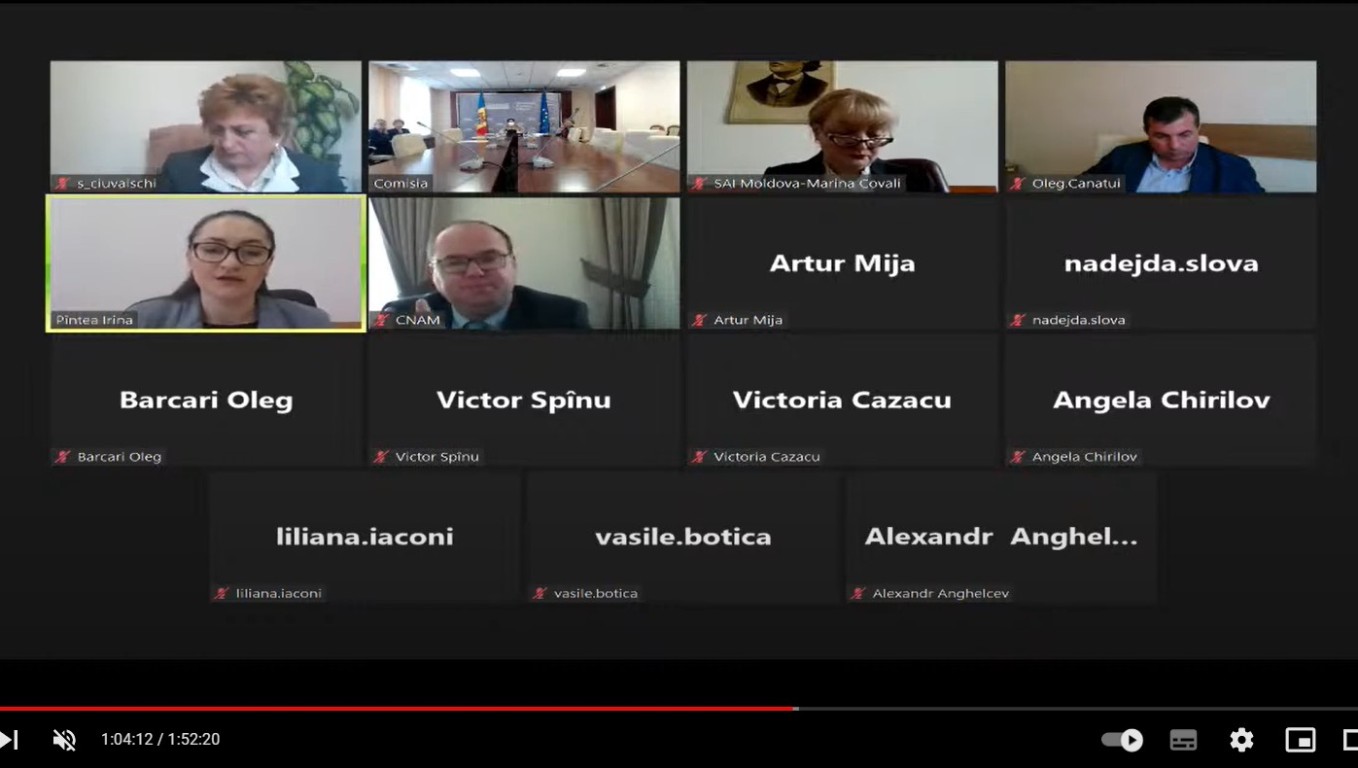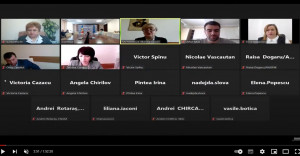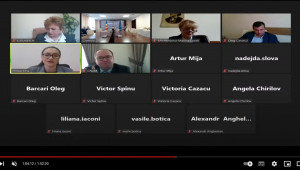
The Court of Accounts of the Republic of Moldova (CoARM) presented on April 6, within the Public Finance Control Committee (PFCC) of the Parliament of the Republic of Moldova, the Financial Audit Report of the Government’s Report on the execution of the state social insurance budget (SSIB) in 2020 and the Financial Audit Report of the Government’s Report on the Execution of Compulsory Health Insurance Funds in 2020.
The Court of Accounts informed the PFCC’s members about the results of the audits, the recommendations made and the conclusions.
With regard to the execution of SSIB, it was mentioned that were audited the revenues from contributions and those from transfers from the state budget, which amounted to more than 24 billion lei. Were also audited the most significant expenditures, which were mainly used to provide social benefits amounting to 23.8 billion.
In the opinion of the Court of Accounts, with some exceptions, the Government’s Report on the Implementation of SSIB provides, in all material respects, a fair and accurate picture, according to the applicable reporting framework, with a qualified opinion.
Thus, regarding the debts, the auditors mentioned that NSIH is currently developing IS “Social Protection”, however, the consolidated information related to the debts towards the beneficiaries and their obligations cannot be generated for 2020. In addition, the value of the debts of 111.8 million lei presented in the reports is underestimated, a fact determined by: the impossibility of confirming the debts of the previous year, which were not adjusted and served as a basis for the initial balances of 2020; also, the debt associated with the suspended payments of the benefits, estimated by the audit at about 84.6 million lei, is not included in the accounting records. Therefore, the auditors were limited in scope to verifying the formation of the debt presented.
With regard to claims on payments unduly paid to beneficiaries, it is noted that the amounts recorded and reported in this chapter are reduced. The factors that led to the reduction of receivables are both internal and external, and as an example are:
- the lack of the mechanism for transmitting and registering the social assistance payments paid unfounded to the beneficiaries and identified by the Social Inspection, amounting to 2.2 million lei;
- lack of evidence of amounts unduly paid as sole support and financial support in the total amount of 0.6 million lei.
Regarding the granting of social benefits, in terms of compliance, deficiencies were found in determining the amount of the pension of former employees of law enforcement institutions. In more than 93% of the cases examined, the errors were due to the fact that, in determining the length of the service, were irregularly included periods of two months' length of service for one month of duty during the activity within the subdivisions of guarding, escorting and detaining persons detained and arrested in remand centers. As a result, the audited beneficiaries were paid 435.1 thousand lei more than they should have.
Executing SSIB in 2020 has faced many challenges. The long-standing epidemiological situation has necessitated the establishment of measures to support citizens, as well as to provide safe services for both citizens and employees of the institutions involved.
Thus, during the state of emergency, more than 14,000 citizens benefited from unemployment benefits amounting to 69 million lei. At the same time, was established the payment of the allowance for the descendants of the medical staff who died as a result of the medical activity to combat the pandemic, in the amount of 1.3 million lei, as well as other benefits to support the citizens.
Regarding the implementation of CHIF, the auditors noted that in 2020 the revenue and expenditure indicators were specified 4 times, a situation generated by the impact of the pandemic, as well as the adoption of additional motivating measures for medical staff. The volume of medical services guaranteed by the state and provided to the citizens by the medical institutions was carried out within 6 sub-programs: primary health care services, outpatient, hospital, high performance, pre-hospital and community emergencies.
It is noted that, during the pandemic period, the executed revenues of CHIF amounted to 8 billion 542 million lei and registered an increase compared to 2019 by 906 million lei.
During the exceptional situation in public health, 57 hospital medical institutions benefited from financial means in the amount of 619 million lei, which were intended to cover unrealized contractual volumes through medical services. In the context in which the scheduled medical services were suspended, this measure aimed at ensuring the continuity of activities and the concentration of resources in providing medical care to patients admitted with Covid-19.
With regard to the pre-hospital emergency medical services, in the amount of 791 million lei, it is revealed that the contracting principle has changed from "per capita", which implies an exact limit to establish the volume of funding, to "global budget" - a principle that does not it is based on exact funding criteria. The volume of financial means contracted and paid according to the “global budget” method increased by 140 million lei, while the only provider of pre-hospital emergency services serves the same number of population. Thus, in 2020 the contracting of pre-hospital emergency services did not have criteria and needs, and the allocation of financial means is not based on result indicators correlated with the medical services provided to the citizens.
The evaluation of the process of contracting and performing emergency hospital services established that the National Center for Emergency Hospital Care is the only provider of emergency services for the entire population of the Republic of Moldova. At the same time, he contracted emergency pre-hospital services, amounting to 23 million lei, from two medical institutions. The procedure for procuring medical services is not covered by the Law on Public Procurement, and the tariffs applied to contracting private providers have not been duly approved.
In 2020, the National Medical Insurance Company granted, for 313 public medical institutions, subsidies to cover the increase of personnel expenses, in the amount of 355 million lei. Given that the salaries of employees in medical institutions have increased by 30%, these salary increases have not been included in the tariffs of medical services, although the regulatory framework sets out exact requirements regarding the composition and elements of the tariffs.
The meeting also addressed issues related to the payment of the medical compulsory health insurance (MCHI), namely that during the emergency period only 3705 people who crossed the state border by air paid the MCHI premium. Another 17,614 people did not ensure the regular payment of payments in the funds of the compulsory health insurance, in the amount of 71 million lei.
Finally, the Court of Accounts informed that the Government’s Report on the Execution of Compulsory Health Insurance Funds, in all material respects, provides a fair and accurate picture of the implementation of CHIF in 2020, according to the applicable financial reporting framework.
 WITH DEFICIENCES OF VIEW
WITH DEFICIENCES OF VIEW Youtube
Youtube Facebook
Facebook


 print
print






